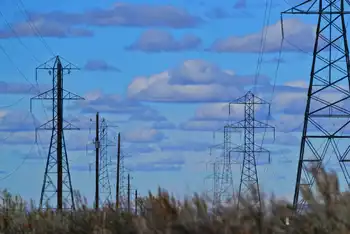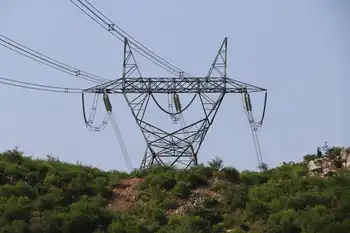Touted as solution to garbage crisis, Ontario refuses to wade into mire
TORONTO, ONTARIO - Incinerating the garbage that Ontario trucks to Michigan landfills could produce enough power for about 200,000 homes, not enough to solve the province's looming energy crisis but certainly a help.
As a double bonus, it could also be the answer to Ontario's waste-disposal crisis.
"There are jurisdictions throughout the world that use energy from waste... They have (as) rigorous environmental standards as we do, in Europe, so if they can do it, the question is: Why can't we?" says Energy Minister Donna Cansfield.
A big reason is the provincial government's refusal to get involved and lead a public debate or endorse incineration and other thermal technologies, says Ontario Environmental Commissioner Gord Miller.
"I don't hear any public debate on these issues. I don't hear any kind of forums or open houses... on energy from waste. All I hear is: `We don't want to talk about this,'" said Miller, who serves as the province's environment watchdog.
Ontario is in the midst of a waste-disposal crisis, with municipalities and businesses sending nearly 4 million tonnes of garbage to Michigan each year, much of it from the Greater Toronto Area.
Ontario also doesn't have enough electrical generating capacity and faces the prospect of brownouts, buying expensive imported power or putting billions of dollars into new power plants.
These two shortages, combined with community opposition to building new landfills, has some municipalities starting to look at incinerators and other thermal technologies.
York and Durham regions, for example, start three days of public meetings tomorrowon the possibility of building an energy-from-waste incinerator to deal with what they can't recycle or divert. But in absence of a provincial position on incineration, municipalities find themselves sandwiched between environmentalists who say burning garbage isn't safe and proponents of various technologies who promise to solve all their problems.
"The Ministry of the Environment has to look at this closely and endorse general technologies. They should enter into the debate and, if they're asked, `Is it possible to design and operate energy-from-waste facilities within safe parameters,' they should be prepared to say `yes'" Miller said.
So, is Environment Minister Laurel Broten willing to do this?
No. Broten says she's "open" to having new energy-from-waste facilities in Ontario, but she also says it's not her job to lead a public debate or broadly endorse technologies.
"We're willing to look at new technologies and support (municipalities) in their endeavours to look at new technologies," Broten said.
"We will make a determination based on each and every application, but not a broad stroke perspective on what is clean and what is not clean in the abstract. That doesn't sufficiently protect Ontarians," she said.
Properly built, well-run and regulated, incineration is perfectly safe, Miller said.
"The Ministry of the Environment understands this. They're just quiet on it," he said. The general public, though, isn't so sure, he added.
"In Ontario, we have a legacy of poorly managed facilities; we had some problems with incinerators, there is no question and so the public is jaded, they should be. They know it was bad," Miller said.
That's why proponents with other thermal technologies, like gasification which heats garbage at high heat but doesn't actually put it to an open flame, take great pains to say: "It's not incineration."
But, times — and technologies — have changed, Miller said.
"We have an incinerator right here in Peel region that is meeting all the standards," he said, adding Europeans have also proved incineration is safe.
"There's a role for the provincial government to restore the public trust," he said.
Until that happens, municipal councillors will have a tough time navigating between those who oppose incineration and those who favour it.
"They're going to have to fight it out and that's not fair for municipalities that are bold enough to come forward," Miller said.
So far, Niagara, Hamilton, York and Durham have stepped into the fray and said they're interested in incineration.
Toronto, which ships the most trash to Michigan, is also undertaking an environmental assessment that will look at all the options, including incineration. But the mayor and some councillors have already said they oppose incineration.
Ottawa and Southgate Township, in the Collingwood-area, want to do small-scale pilot projects on gasification technologies.
But municipalities shouldn't think that energy from waste is a magic bullet, warns Nigel Guildford, a board member of the Ontario Waste Management Association, which represents private waste industry players.
Just as the debate needs less "hysterical scare mongering" it also needs less "uninformed promotion," said Guildford. "Energy from waste is not a cheap way to produce power, it is an expensive way to get rid of garbage," he said.
Peel Region, for example, pays $130 a tonne to collect and ship garbage to Michigan, compared to $170 to collect it, burn it at the Algonquin Power incinerator, and pay to dispose of the fly ash in a hazardous waste landfill.
That makes incineration more expensive than landfill but about the same price as some recycling measures. Toronto's green-bin organics program, for example, costs $165 a tonne.
The debate around energy from waste needs to be based on "good science, good engineering and good economics," Guildford said.
That may not be possible right now.
"There's a complete absence of coherent provincial policy that would allow energy from waste to be developed as part of an integrated waste-management system," he said.
Andrew Campbell, York Region's director of waste management, is hoping, through public meetings this week, that York and Durham residents will have a better understanding of the options.
"Now that the word incineration is out there, we may get more people out. I really want people to be educated about what modern incineration is," Campbell said.
Campbell believes there is strong public support for modern incineration in the region because residents don't want another Keele Valley landfill or to keep shipping to Michigan.
"If you prohibit energy from waste facilities, what happens to the garbage? Now we're trucking it to Michigan. Is that a viable solution? Or we'll be creating large super landfills. Is that an environmentally benign solution? From my perspective, one has to look at it holistically," Environmental Commissioner Miller said.
The energy minister has a similar view.
"You bury the garbage to get the methane to get the electricity," said Cansfield, referring to the collection of landfill gas. "You can deal with the garbage without burying it to get the electricity. To me it makes sense to connect the other two and forget about the burying."
Related News

Canada to spend $2M on study to improve Atlantic region's electricity grid
HALIFAX - The federal government will spend $2 million on an engineering study to improve the Atlantic region's electricity grid.
The study was announced Friday at a news conference held by 10 federal and provincial politicians at a meeting of the Atlantic Growth Strategy in Halifax
The technical review will identify the most important transmission projects including inter-provincial ties needed to move electricity across the region.
Nova Scotia Premier Stephen McNeil said the results are expected in July.
Provinces will apply to the federal government for funding to build the infrastructure. Utilities in each province will be expected to pay some portion of the…




